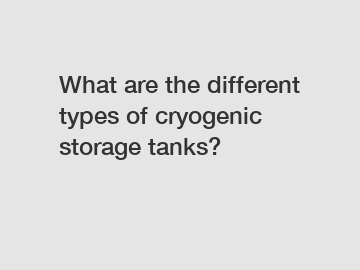Dec. 12, 2023
Machinery
What are the different types of cryogenic storage tanks?
Cryogenic storage tanks are essential for storing materials at extremely low temperatures, typically below -150 degrees Celsius. These tanks offer a safe and efficient solution for preserving gases, liquids, and other materials in various industries, including healthcare, scientific research, and manufacturing. With their unique design and features, cryogenic storage tanks ensure that materials are kept at optimal conditions, preventing evaporation and maintaining product integrity.
In this article, we will explore the different types of cryogenic storage tanks and their applications. Let's delve into the fascinating world of cryogenic technology:

1. Dewar Flask:
A Dewar flask, also known as a cryogenic flask or Dewar bottle, is a common type of cryogenic storage vessel. It consists of a double-walled container with a vacuum between the two walls. The vacuum acts as an excellent insulator, minimizing heat transfer between the interior and exterior. Dewar flasks are commonly used for small-scale storage of cryogens such as liquid nitrogen and oxygen. They find widespread application in laboratories, hospitals, and research facilities.
2. Vertical and Horizontal Storage Tanks:
Vertical and horizontal storage tanks are large-scale cryogenic vessels designed to store and transport bulk quantities of cryogenic materials. Vertical storage tanks have a cylindrical shape standing upright, while horizontal tanks have a similar shape but lie horizontally. These tanks are made with high-quality materials such as stainless steel to ensure durability and minimize heat transfer. They are ideal for industries that require large quantities of cryogens, including gas manufacturers and semiconductor manufacturers.
3. LNG Storage Tanks:
Liquefied Natural Gas (LNG) is a cryogenic liquid used primarily as a fuel source. LNG storage tanks are specifically designed to store and transport LNG at cryogenic temperatures. These tanks have a double-wall construction, similar to Dewar flasks, with an inner tank made of specialized cryogenic materials such as 9% nickel steel. The space between the inner and outer tanks is filled with insulation to maintain the low temperatures required for LNG storage. LNG storage tanks are critical pieces of infrastructure for the energy industry, enabling the safe and efficient distribution of natural gas.
4. Cryogenic Pressure Vessels:
Cryogenic pressure vessels are engineered containers designed to hold cryogenic substances under high pressure. These vessels are typically used for gases such as liquid oxygen, liquid nitrogen, and liquid helium. Due to the high pressure involved, cryogenic pressure vessels are constructed with robust materials and undergo rigorous testing to ensure safety and reliability. They find applications in various industries, including aerospace, pharmaceuticals, and refrigeration.
In conclusion, cryogenic storage tanks come in various types and designs to cater to specific storage and transportation requirements. From small-scale Dewar flasks to large-scale vertical and horizontal tanks, each type serves a unique purpose. The development of specialized cryogenic storage tanks, such as those designed for LNG and cryogenic pressure vessels, has revolutionized industries like energy and healthcare. These tanks provide a safe and efficient solution for storing materials at extreme temperatures, ensuring their integrity and facilitating their use in various applications. Whether it is preserving biological samples or transporting LNG across oceans, cryogenic storage tanks play a vital role in many areas of modern technology and industry.
If you want to learn more, please visit our website Argon Dewar Tank, Liquid Oxygen Micro Bulk Storage Tank, Cryogenic Pressure Vessel Design.
If you are interested in sending in a Guest Blogger Submission,welcome to write for us!
All Comments ( 0 )